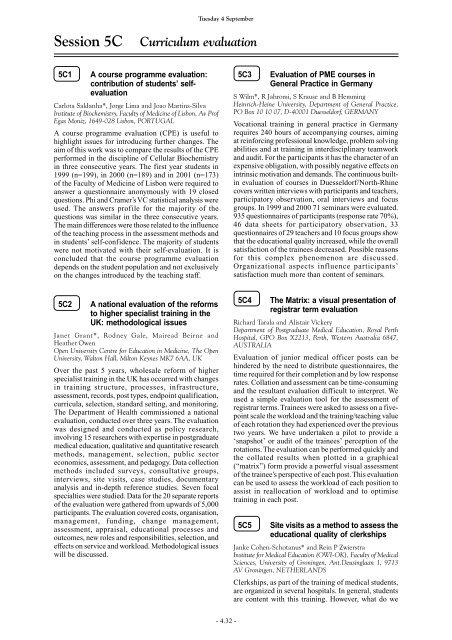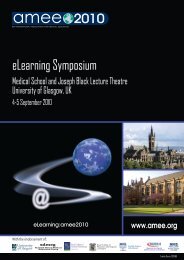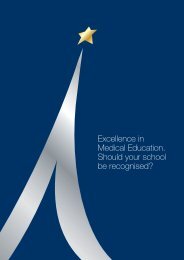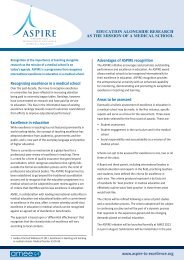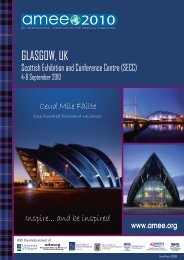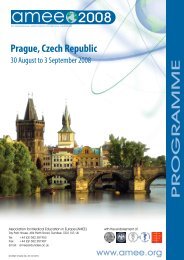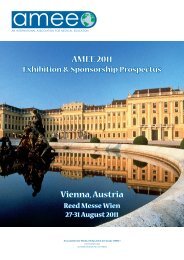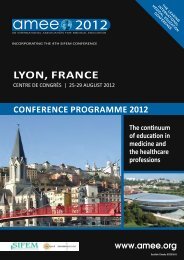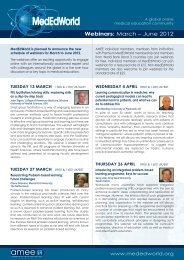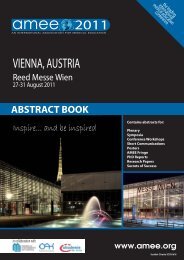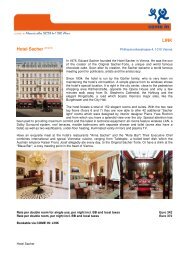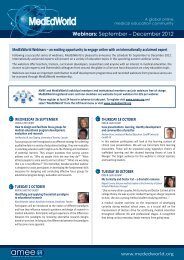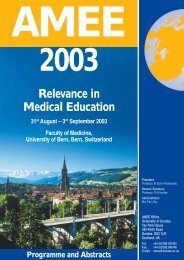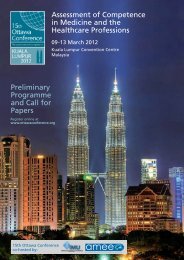AMEE Berlin 2002 Programme
AMEE Berlin 2002 Programme
AMEE Berlin 2002 Programme
You also want an ePaper? Increase the reach of your titles
YUMPU automatically turns print PDFs into web optimized ePapers that Google loves.
Session 5C Curriculum evaluation<br />
5C1 A course programme evaluation:<br />
contribution of students’ selfevaluation<br />
Carlota Saldanha*, Jorge Lima and Joao Martins-Silva<br />
Institute of Biochemistry, Faculty of Medicine of Lisbon, Av Prof<br />
Egas Moniz, 1649-028 Lisbon, PORTUGAL<br />
A course programme evaluation (CPE) is useful to<br />
highlight issues for introducing further changes. The<br />
aim of this work was to compare the results of the CPE<br />
performed in the discipline of Cellular Biochemistry<br />
in three consecutive years. The first year students in<br />
1999 (n=199), in 2000 (n=189) and in 2001 (n=173)<br />
of the Faculty of Medicine of Lisbon were required to<br />
answer a questionnaire anonymously with 19 closed<br />
questions. Phi and Cramer’s VC statistical analysis were<br />
used. The answers profile for the majority of the<br />
questions was similar in the three consecutive years.<br />
The main differences were those related to the influence<br />
of the teaching process in the assessment methods and<br />
in students’ self-confidence. The majority of students<br />
were not motivated with their self-evaluation. It is<br />
concluded that the course programme evaluation<br />
depends on the student population and not exclusively<br />
on the changes introduced by the teaching staff.<br />
5C2 A national evaluation of the reforms<br />
to higher specialist training in the<br />
UK: methodological issues<br />
Janet Grant*, Rodney Gale, Mairead Beirne and<br />
Heather Owen<br />
Open University Centre for Education in Medicine, The Open<br />
University, Walton Hall, Milton Keynes MK7 6AA, UK<br />
Over the past 5 years, wholesale reform of higher<br />
specialist training in the UK has occurred with changes<br />
in training structure, processes, infrastructure,<br />
assessment, records, post types, endpoint qualification,<br />
curricula, selection, standard setting, and monitoring.<br />
The Department of Health commissioned a national<br />
evaluation, conducted over three years. The evaluation<br />
was designed and conducted as policy research,<br />
involving 15 researchers with expertise in postgraduate<br />
medical education, qualitative and quantitative research<br />
methods, management, selection, public sector<br />
economics, assessment, and pedagogy. Data collection<br />
methods included surveys, consultative groups,<br />
interviews, site visits, case studies, documentary<br />
analysis and in-depth reference studies. Seven focal<br />
specialties were studied. Data for the 20 separate reports<br />
of the evaluation were gathered from upwards of 5,000<br />
participants. The evaluation covered costs, organisation,<br />
management, funding, change management,<br />
assessment, appraisal, educational processes and<br />
outcomes, new roles and responsibilities, selection, and<br />
effects on service and workload. Methodological issues<br />
will be discussed.<br />
Tuesday 4 September<br />
- 4.32 -<br />
5C3 Evaluation of PME courses in<br />
General Practice in Germany<br />
S Wilm*, R Jahromi, S Krause and B Hemming<br />
Heinrich-Heine University, Department of General Practice,<br />
PO Box 10 10 07, D-40001 Duesseldorf, GERMANY<br />
Vocational training in general practice in Germany<br />
requires 240 hours of accompanying courses, aiming<br />
at reinforcing professional knowledge, problem solving<br />
abilities and at training in interdisciplinary teamwork<br />
and audit. For the participants it has the character of an<br />
expensive obligation, with possibly negative effects on<br />
intrinsic motivation and demands. The continuous builtin<br />
evaluation of courses in Duesseldorf/North-Rhine<br />
covers written interviews with participants and teachers,<br />
participatory observation, oral interviews and focus<br />
groups. In 1999 and 2000 71 seminars were evaluated.<br />
935 questionnaires of participants (response rate 70%),<br />
46 data sheets for participatory observation, 33<br />
questionnaires of 29 teachers and 10 focus groups show<br />
that the educational quality increased, while the overall<br />
satisfaction of the trainees decreased. Possible reasons<br />
for this complex phenomenon are discussed.<br />
Organizational aspects influence participants’<br />
satisfaction much more than content of seminars.<br />
5C4 The Matrix: a visual presentation of<br />
registrar term evaluation<br />
Richard Tarala and Alistair Vickery<br />
Department of Postgraduate Medical Education, Royal Perth<br />
Hospital, GPO Box X2213, Perth, Western Australia 6847,<br />
AUSTRALIA<br />
Evaluation of junior medical officer posts can be<br />
hindered by the need to distribute questionnaires, the<br />
time required for their completion and by low response<br />
rates. Collation and assessment can be time-consuming<br />
and the resultant evaluation difficult to interpret. We<br />
used a simple evaluation tool for the assessment of<br />
registrar terms. Trainees were asked to assess on a fivepoint<br />
scale the workload and the training/teaching value<br />
of each rotation they had experienced over the previous<br />
two years. We have undertaken a pilot to provide a<br />
‘snapshot’ or audit of the trainees’ perception of the<br />
rotations. The evaluation can be performed quickly and<br />
the collated results when plotted in a graphical<br />
(“matrix”) form provide a powerful visual assessment<br />
of the trainee’s perspective of each post. This evaluation<br />
can be used to assess the workload of each position to<br />
assist in reallocation of workload and to optimise<br />
training in each post.<br />
5C5 Site visits as a method to assess the<br />
educational quality of clerkships<br />
Janke Cohen-Schotanus* and Rein P Zwierstra<br />
Institute for Medical Education (OWI-OK), Faculty of Medical<br />
Sciences, University of Groningen, Ant.Deusinglaan 1, 9713<br />
AV Groningen, NETHERLANDS<br />
Clerkships, as part of the training of medical students,<br />
are organized in several hospitals. In general, students<br />
are content with this training. However, what do we


